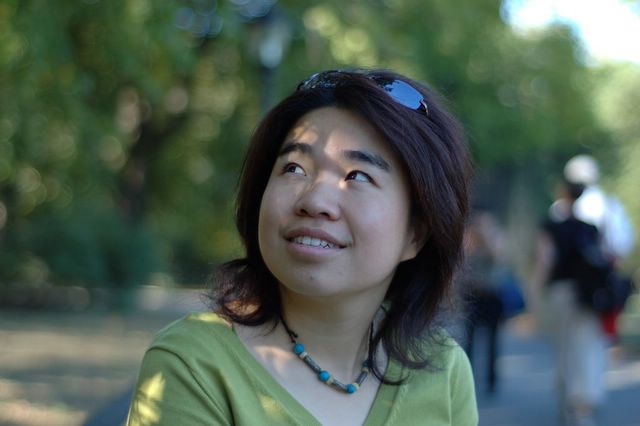2006年6月19日星期一
Identity , a review
http://www.yale.edu/yrb/spring99/review06.htm
On a balmy day on a Normandy beach, Jean-Marc searches for his lover Chantal. He spots her strolling and gazing at sailboats. Beside her, children speed down the beach in cars powered sails. Suddenly, one car swerves towards Chantal, and it appears as if the car will strike her. As usual, Chantal is oblivious to her surroundings. Jean-Marc screams to warn her, but she cannot hear. "His face clenched in a grimace of weeping, for a few seconds he is living with the horror of her death."
Somehow the car misses her. "Jean-Marc laughs at the comedy of bereavement he'd just played out....he really sets off running and waving his hands." But as he approaches Chantal, she fails to recognize him, and as he gets even closer, the woman "he had thought was Chantal became old, ugly, pathetically other." In his worry, Jean-Marc had mistaken an unattractive stranger for his love.
So begins Identity, the new novel by the highly praised Franco-Czech writer Milan Kundera. The novel explores the question of human identity and whether its possible for lovers to understand each other in a world that is forever trapped on the level of the physical and the shallow.
In Identity, Kundera trades the polyvocal complexity of his earlier novels for a tighter, more conventional form. Populated by only two main characters, Identity is Kundera's shortest novel. But although light in pages, Identity sets out to tackle a hefty subject-the nature of human identity.
Despite its heavy theme, the central plot of the novel is fairly simple. One day Chantal notices that as a woman already possessed by a lover, other men no longer look at her. Distraught, she tells Jean-Marc. Misunderstanding the cause of her distress, Jean-Marc begins sending Chantal anonymous love letters to reassure her of her beauty. "I follow you around like a spy-you are beautiful, very beautiful," states the first. As the anonymous love letters continue, this secret divides the lovers, and a domino effect of misinterpretations follows.
When Chantal finally discovers the sender of the letters, she imagines entrapment-not reassurance-as Jean-Marc's goal. When Jean-Marc discovers that Chantal keeps all the letters, he imagines infidelity, instead of curiosity. The characterizations of Jean-Marc and Chantal are indelibly real, but the central plot seems forced. We are never suprised at the identity of the letter writer, and Chantal's many attempts to discover his identity, although often hilarious, become plodding.
As the lovers slip apart, the novel becomes increasing surreal. At the end Chantal is walled into a strange house the night after an orgy, the ultimate loss of identity, and Jean-Marc succumbs to amnesia sleeping on a park bench. The ending seems so strange and tragic, that Kundera's voice, which had remained silent for the entire novel, must break in to comfort us.
"And I ask myself: who was dreaming?" Kundera writes. "Who dreamed this story? Who imagined it? She? He? Both of them?"
Never fear, Kundera says, the plot was all a dream. Some critics have pointed to the dream ending as a serious flaw in the narrative, and it certainly feels as if we have been swindled of a proper ending. But could Kundera have a deeper purpose? Perhaps, he is suggesting the impossibility of separating lovers who have defined themselves through each other, or maybe, Kundera is calling into question the identity of the novel itself. What is a novel, after all, but an author's dream? But one can only guess at the causes for the novel's abrupt ending.
Kundera gained fame writing against the Soviet occupation of Prague, but unlike Tom Clancy, the end of the Cold War has not left Kundera short on targets, as he criticizes the emptiness of modern life. In the collective struggle against boredom, people engage in dull occupations and fake freinships. About all the modern world is suited for, Kundera seems to say, is to provide fodder for conversation. In a café, Jean-Marc and Chantal sit next to a silent couple. After a captivating dialogue speculating about the causes of the couple's silence, Jean-Marc concludes, "Two people in love, isolated from the world, that's very beautiful. But what would they nourish their intimate talk with? However contemptible the world may be, they still need it to be able to talk together."
"They could be silent," replies Chantal.
"Like those two at the next table?" Jean-Marc laughed. "Oh, no, no love can survive muteness."
Identity is the product of a remarkably observant social commentator and gifted writer. Like Kundera's earlier work, it is intellectually stimulating and can reinterpret everyday events with brilliance. But for all his wit, this incarnation of Kundera's world suffers from a lack of narrative, something which even the most philosophical of novels require.
订阅:
博文评论 (Atom)


没有评论:
发表评论